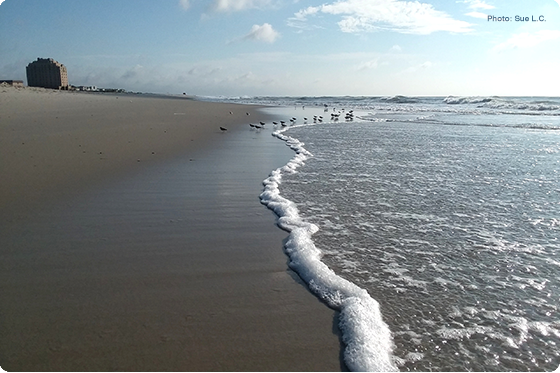
On May 3, New Jersey governor Phil Murphy signed into law a bill intended to protect the public’s access to state beaches. The legislation codifies the state’s public trust doctrine, which ensures that tidal waters and adjacent shorelines are available to the public for navigation, commerce, and recreation, including bathing, swimming, and fishing. Generally, the public trust doctrine—a common law holdover from ancient Roman times—establishes the principle that the sovereign holds some resources in trust for public use regardless of private property ownership. Although the doctrine differs in specifics among the fifty states, it most frequently applies to bodies of water, such as oceans, lakes, and rivers.
Specifically, the new legislation requires the New Jersey Department of Environmental Protection (NJ DEP) to promote access in its funding and permitting decisions involving coastal and other regulatory programs. For example, under the requirements of the new law, NJ DEP is authorized to review certain permit applications to determine whether increased access should be a condition of approval. The law also requires the agency to consider changes in public access when considering changes in development in waterfront areas, a trend that is occurring more frequently as more urban areas are redeveloped.
The access law comes in the wake of the widespread controversy that New Jersey and several other coastal states have become embroiled in as some local communities attempt to severely restrict beach access. Due to a high demand for water access in New Jersey, public beach access has been long quarreled over by access advocates, private property owners, and the state government. Some seaside communities have actively worked to discourage outsiders from accessing their beaches in recent years by using strategies such as restricting beach badge sales to residents-only, drastically limiting public parking, prohibiting food on the beach, and refusing to provide public restrooms, among other things. While some of these tactics, such as the restriction of beach badge sales, have been deemed illegal by the courts, physical and legal obstacles to public beach access remained high.
As can be expected with any dispute involving property rights, the reactions to New Jersey’s access law have been extremely varied. From proponents’ perspectives, the legislation was supported by almost every major conservation, fishing, and surfing organization in the state, from beach advocates to defenders of access along urban waterways. The executive director of the American Littoral Society, a marine conservation group, even noted that the law provides New Jersey citizens with policies that will strengthen and promote public access to all tidal waters, including those along rivers and backbays.
However, some conservationists have argued that the legislation doesn’t go far enough. For example, the executive director of the New Jersey Sierra Club stated that the law contains vague language that could lead to widespread lawsuits from towns that have fought public beach access for years. Furthermore, some have argued that the role of public access and shoreline development should be integrated into the gubernatorial administration’s efforts to adapt and respond to climate change.
Opponents of the law remain steadfast in their arguments that public beach access should be restricted where possible in order to better accommodate private owners and increase the security of waterfront properties. Such critics previously found a sympathetic ear in former New Jersey governor Chris Christie, who left it to local communities to decide what level of public access was appropriate.
Although many conservationists and access advocates in the state see the law as a good first step forward, many more contentious, infrastructure-related issues are not addressed in the current law, with state legislators stating that they will be addressed in a second bill. For example, the new law currently exempts certain waterfront infrastructure sites linked to homeland security (such as oil and gas facilities) from public access requirements. As the state continues to deal with any remaining access issues as well as the possibility of retaliatory legislation, New Jersey citizens will soon reap the benefits of the recently enacted law as it goes in to effect at the beginning of July. The full text of the law can be found here.












